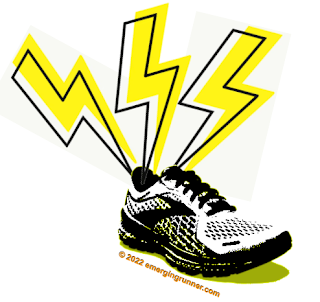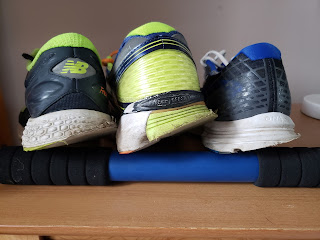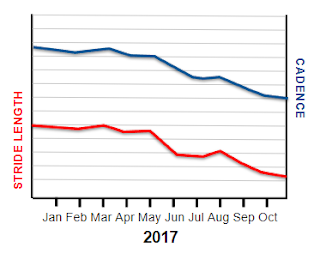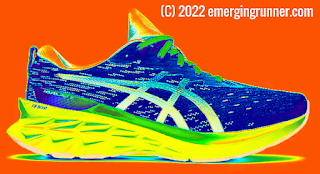 |
| The Shoe-pocratic Oath: "First do no harm" |
Unless you're
Abebe Bikila, the barefoot marathoner who won the Olympic marathon in 1960, shoes are pretty essential gear. Though some runners are indifferent to what shoe they wear and view them as tools, others (like me) look at shoes as something that can greatly enhance or diminish their running experience. I love running shoes but they don't always love me, and I'm dealing with that right now.
The Problem
In my last post, I mentioned some issues I'm having with my lower back. Recently, I've been feeling occasional pain and numbness along my right leg, hip and glute when I run. I suspect it may be a reoccurrence of a 2015 disc problem. Back then, my undisciplined training caused the rupture of my L4 and L5 discs, as well as a torn annular ligament. As a result, my orthopedist strongly recommended that I stop running for almost five weeks.
 |
| High Octane alternative motion contraption |
During that time, I was at Consumer Reports and had the opportunity to
participate in a panel to test
"alternative motion machines." These devices functioned like advanced elliptical machines and provided an excellent daily workout. This "zero impact" training helped my disc problem and I recovered well enough to resume my daily runs.
Fast forward seven years and I'm dealing with similar symptoms. My gait is awkward at the start of my runs but it settles down after a few minutes. Due to that, my first miles have been 30-40 seconds slower than my second. I've been running well and feel ready to add more distance. I'm holding off on that because the symptoms are reappearing once I reach the three mile mark.
The Cause
I believe that some of my running shoes are either causing or exacerbating my leg problem. I under pronate and originally ran in stability shoes like Brooks Adrenalines and ASICS GT 2140s. When I started Runner's Tech Review, companies would send me models of their newest running shoes to test. From that, I developed a preference for lightweight neutral trainers like the Saucony Kinvara and that became my default. I still prefer neutral running shoes, but they may not be a good choice for me.
My under pronation worsened after my disc and ligament problem. I started to notice how quickly I was wearing out the lateral side heel of every pair of shoes I had. I'd get 800 miles on a pair of Adrenalines but less than half of that with non-stability models. When I looked at the three oldest shoes in my rotation, I was surprised to see how much wear they showed. The difference in heel height from side to side was greater than 3mm. This is a recipe for running injury.
 |
| Worn to Run |
I concluded that 60% of my running shoes were no longer runnable. That left me with two pair, the
Saucony Kinvara 11s and the
Reebok Floatride Run Fast 3s. Neither of these shoes have much mileage on them yet, but the Kinvaras are already starting to show a similar wear pattern. The Reeboks are still pristine and I want to preserve those peppy and propulsive shoes as long as possible.
Searching for Shoe Love
After looking up every single running shoe on the internet, reading every review and watching every video, I narrowed it down to a few models. Included in this group was the Hoka Rocket X, which is described on the Hoka site as, "...an incredibly lightweight, insanely responsive racer geared for elite athletes." Check, check and check! I don't want to brag, but I did take second place in my age group in a 2009 5K.
Despite deep devotion to Hokas by my fellow Runsketeers, I've always resisted the brand. They just seemed too high and bulky for my taste. When I stumbled upon a site called Hoka Outlet and saw the Rocket X for sale for $49.95 in my size (these shoes typically sell for $199) I thought, what do I have to lose? Answer: $49.95 plus tax. Yes, it was a scam. I did manage to get my money back from PayPal, but I'm embarrassed by my naivety.
 |
| Beware of Hokey Hokas |
An Unlikely Solution
After the Hoka con, it was back to square one. I would continue my search for new shoes, but I wanted at least one additional pair right away. I considered my NB 680s that I use on the treadmill but I don't like to use my indoor shoes outside. I was about to grab my keys and head to the nearby DSW store to buy a cheap pair of stability trainers when something green caught my eye. Tucked under some winter clothes in my running gear closet was an 11 year old pair of
Karhu Fast 2s that I'd tested and then quickly discarded.
.jpg) |
| Lapland Lappers |
Karhu sent me these light
-ish but high riding performance shoes to test during a period when I was wearing ultra minimal zero drop shoes like the Brooks Pure Drifts and Saucony Hattoris (below). The Fast 2's at 9.6 ounces were anything but minimal.
 |
| Hattori - 4.4 oz |
 |
| Pure Drift - 5.6 oz |
The Karhus were probably ahead of their time with their high stack height and "fulcrum" technology that facilitated a rolling gait. I found them awkward in 2011, but when I put them on now they feel cushioned and well balanced. Since I used them only to test, the shoes are still in like-new condition. I took them out for a run and appreciated the forward leaning motion and the responsive midsole. My pace almost matched the Reeboks, which are considered a bona fide racing shoe.
With my Finnish flyers added to the mix, I'm only short one pair to round out my rotation. The Kinvara is a light trainer that works well for tempo runs. The Reeboks are speedy and fun, perfect for intervals and when I want to run my fastest. The Karhus sit somewhere between these two. I'm going to focus my search on cushioned but light stability shoes that provide a responsive ride. I may end up paying more than I ever have for a running shoe to get what I want, but it will be worth it. Who knows, maybe I'll stumble upon an outlet that's selling Saucony Guide 15s or ASICS DS Trainer 26s for $60.
Either way, I'll let you know. 🏃











.jpg)



